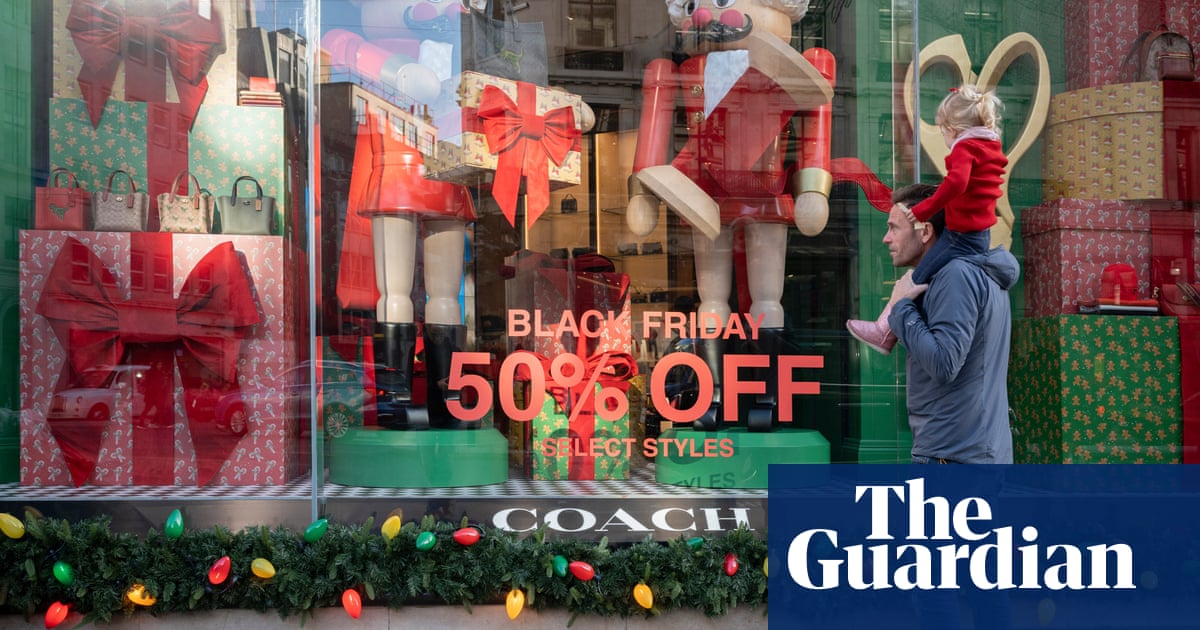
The number of shoppers hitting the Boxing Day sales has bounced back after last year’s Covid-hit Christmas – but remained well below levels seen before the pandemic.
The shopper tracking agency Springboard said there had been a 50% rise in shopper numbers out on Monday compared with Boxing Day last year, when the Omicron variant of Covid-19 prompted many to stay at home. However, footfall remained 30.5% down on 2019 levels.
Diane Wehrle, the insights director at Springboard, said sunny weather had helped tempt more shoppers out than she had expected in what she thought was “a bit of a last hurrah” before reining in spending because of the cost of living crisis next year.
She said that the bounceback from last year was likely to have been assisted by Boxing Day falling on a Monday compared with a Sunday last year, when a number of large chains chose to remain closed while others reduced trading hours.
“Footfall has undoubtedly been helped by the calm and sunny weather, which will have encouraged consumers to make trips out. These results provide real reason for optimism among retailers, as they coincide with another rail strike and the underlying challenge of the cost of living crisis,” Wehrle said.
Clothing retailers had been expected to offer deep discounts, as stocks built up during a warm autumn, but most, including Next, Marks & Spencer, New Look and River Island, offered less than 60% off as it appeared the recent cold snap had helped clear coats and knitwear.
The online specialists Asos and Boohoo, however, which have had more competition from high streets, were offering up to 80% and 70% off respectively.
In Manchester, there were queues outside the Arndale centre when it opened at 8am on Monday but the Manchester Evening News pictured a near-empty car park at the out-of-town Trafford Centre mall.
The Birmingham Mail reported that the city centre felt “fairly quiet”, although there were queues outside some stores including Zara, River Island and the cosmetics retailer Lush. Some shops including Home Bargains and Poundland remained shut.
In central London, footfall more than doubled on last year – up 139% – but it was down 22% on 2019. Large queues formed outside the Selfridges department store on Oxford Street from as early as 8am, with traders saying the street was busy.
Dee Corsi, the chief executive of the New West End Company, the trade body that represents retailers and other businesses in central London, said trading remained “resilient”.
She said: “The first restriction-free festive season in three years saw footfall get the closest it’s ever been to pre-pandemic levels, with visitors from across the country making their way into the capital to make the most of all the West End has to offer.
“While I’m heartened to see that the West End’s recovery has continued during a busy festive season, the district would have performed much better if public transport was running as normal. We still have a lot of work to do to recover fully from the pandemic losses, and I’m naturally concerned that the latest proposed rail strikes will dampen optimism and prevent further progress.”
The better-than-expected number of shoppers out and about comes despite predictions that spending will be down by about 4% to almost £3.8bn on Boxing Day, according to analysts at GlobalData for Vouchercodes.
The figure indicates an even bigger dive in the volume of items bought, given that inflation is running at more than 10%, so shoppers will be spending more per purchase.
A slowdown in spending would pile more pressure on retailers already suffering from a lacklustre winter hit by transport and postal strikes, snow and rising bills for energy and food that have reduced spare cash for spending on presents and treats.
Stores may have got a boost from concerns about holdups on deliveries given the spate of postal strikes but more than a third of this year’s Boxing Day bargain hunting is still expected to be done online, where an estimated £1.25bn will be spent.
Personal technology such as mobile phones were among the most sought-after items, according to research by the credit and debit card operator Barclaycard.
It said just over four in 10 (42%) of those questioned said rising living costs would affect their ability to shop in the post-Christmas sales, and of that group almost two-thirds planned to spend less in the sales than they usually would.
However, 30% said they had held off treating themselves, family and friends over the past few months and would use the post-Christmas sales to make up for it.
Harshna Cayley, the head of online payments at Barclaycard Payments, said: “The rising cost of living and inflationary pressures have naturally had an impact on the amount being spent in the post-Christmas sales this year. Having said that, retailers can take confidence knowing shoppers still plan to make the most of the deals and discounts on offer.”
In a further sign of the money-saving atmosphere, three in 10 Britons said they would resell unwanted presents online, with almost two-thirds of those listing their items as early as Christmas Eve or Christmas Day, Barclaycard data showed.
The expected fall in Boxing Day trade compared with last year continues a long decline in popularity of the annual shopping tradition, as the rise of the US-inspired November discount day Black Friday and the move towards starting end-of-year sales before Christmas Day have combined to steal its thunder.
Since Christmas Day fell on a Sunday this year, there is also an extra bank holiday when the shops are open – on Tuesday 27 December – meaning the bargain hunting can be spread over more days, further diluting the significance of 26 December takings.












